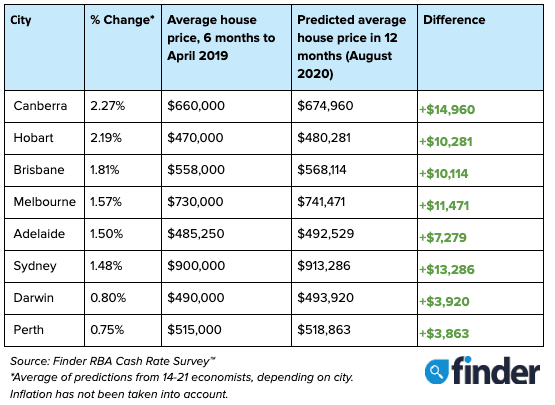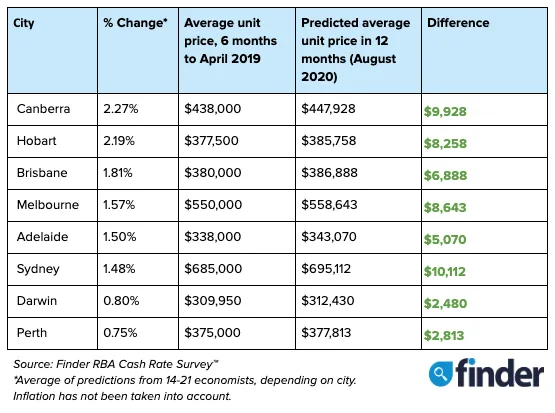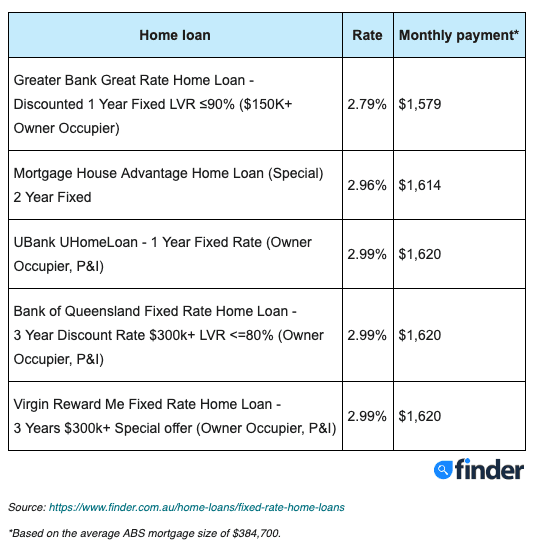- Bessie Hassan
- Head of PR & Money Expert
- finder.com.au
- +61 402 567 568
- Bessie.Hassan@finder.com.au
Media Release
RBA Survey: Property prices to rise in all capitals as cash rate holds
- Experts and economists predict house prices will rise by August 2020
- Canberra and Hobart likely to see the biggest increases
- Fixed rate home loan rates continue to tumble
6 August, 2019, Sydney, Australia – Property values are set to rise by August 2020 across the nation, according to Finder, Australia's most visited comparison site.
In the latest Finder RBA Cash Rate Survey™ – the largest of its kind in Australia – experts and economists gave their forecasts for property prices in Australia's capital cities over the next 12 months.
With property prices showing the second rise in as many months in Sydney and Melbourne, experts, on average, now anticipate the property market to be on the way up over the next year.
Graham Cooke, insights manager at Finder, said it's too soon to tell if this is an emerging recovery in the housing market or merely a "dead-cat bounce".
"In finance, the saying is that even a dead cat will bounce if it falls from great heights.
"Most economists surveyed foresee small levels of growth across the board, but a few tipped prices to tumble, especially in Sydney and Melbourne where one expert predicted a 7% drop.
"Whether you see this as a falling feline or the beginning of a true rebound, it's clear that the full effects of the RBA's recent cuts have yet to play out.

"However, after one of the strongest weekend clearance rates in Sydney in recent months (71%), there is definitely a detectable pulse," Cooke said.
Of all the capital cities, Canberra came out on top with a 2.27% predicted growth on average, followed by Hobart (2.19%) and Brisbane (1.81%).
Cooke said those considering getting on the property ladder need to get their ducks in a row.
"Prospective first-time buyers should look at arranging pre-approval for finance soon if they want to take advantage of low rates before prices increase."
With rates at an all-time low, the Reserve Bank of Australia (RBA) held the cash rate at 1.00% for the first time in 3 months.
Nearly all (96%, 44/46) experts surveyed predicted the hold, although up to two more cuts are likely by the end of the year.

Fixed rates dropping
Recently, three of the Big Four (ANZ, Commonwealth Bank and Westpac) cut fixed-rate home loans by as much as 96 basis points, nearly double the size of the RBA's two latest cash rate cuts.
Jacqueline Dearle of Mortgage Choice said this drop in fixed rates suggests that lenders' long-term outlook is that rates will remain low, but demand has yet to pick up.
"[Our] data shows fixed rate home loans demand is the lowest in eight years (sitting at a mere 13.5%) and we have seen a significant spike in demand for variable loans at the end of July," Dearle said.
Cooke said people might be missing a trick by not considering a fixed-rate loan.
"We've seen a lot of very low fixed-rate offers hitting the market of late, some as low as 2.79%.
"Fixed rates may be well worth considering – as we've never seen rates this low – but the best path may be a split loan.
"Think of this as the best of both worlds: if rates drop you get some of the benefits and if they increase you only get part of the pain.
"Even if you've been on a variable loan for five years, it's not too early to refinance with rates at a record low," Cooke said.

Please note: While all economists participate in the rate forecast part of the survey, additional questions are optional. Therefore, the number of experts answering each question varies.
Here's what our experts had to say:
Nicholas Frappell, ABC Bullion (Hold): "The RBA has time to observe the impact of the last two rate cuts and upcoming tax cuts before making another reduction later 'if required'."
Shane Oliver, AMP Capital (Hold): "The RBA is now in wait-and-see mode. Basically waiting to see the impact of the rate cuts in June and July and tax refunds for low and middle-income earners."
Alison Booth, ANU (Hold): "Not warranted to have further decrease yet, though I predict one later this year."
John Hewson, ANU (Hold): "[The RBA will] wait to see the effects of 50 basis point cuts."
Julie Toth, Australian Industry Group (Hold): "This year has already seen two cash rate cuts, a federal election and a sizeable tax rebate for many households. We should now pause, wait for the effects and then take stock."
Malcolm Wood, Baillieu (Hold): "RBA will wait to assess the impact of its two rate cuts in June and July."
Rebecca Cassells, Bankwest Curtin Economics Centre (Hold): "Moving the cash rate any lower than 1.0% at this point will create further uncertainty in the market, countering any potential benefits and will do little to stimulate investment and consumption responses. Unemployment has held steady as labour force participation continues to climb and inflation has gained some modest ground on the latest figures. Best to hold for the moment."
David Robertson, Bendigo and Adelaide Bank (Hold): "The RBA will probably take the opportunity to pause for a few months to observe the impact of the recent rate cuts, the tax cuts and the lower Australian dollar, all of which should help to a degree."
Ben Udy, Capital Economics (Hold): "The Bank's tone has been more balanced in recent communications. Therefore, we expect the RBA to remain on hold until the economic data deteriorate further by the end of this year."
Michael Blythe, CBA (Hold): "RBA in wait-and-see mode and following the labour market trends."
Dr Craig Emerson, Craig Emerson Economics (Hold): "When the RBA changes the cash rate, it usually does it in two successive months and then waits to assess impacts."
Tim Moore, CUA (Hold): "With two successive cuts, the RBA will want to stand back and observe the effects while also giving the consumer the time to digest the actions as otherwise at risk of further scaring the consumer around the urgency of the cuts, having the opposite effect to being desired."
Trent Wiltshire, Domain (Hold): "The RBA will want to assess the labour market data and leading indicators of the labour market before committing to further cuts."
John Rolfe, Elders Home Loans (Hold): "I believe they went too early with the second cut. They now need to 'cool their heels' a little to allow the two cuts to take effect."
Debra Landgrebe, Gateway Bank Limited (Hold): "Further deterioration required to trigger a further cut."
Mark Brimble, Griffith University (Hold): "It is likely the RBA will pause to see the impact of the two decreases and will also want to hold some monetary policy capacity if needed re the global context."
Tim Nelson, Griffith University (Hold): "No material change from the previous month in relation to key data points and the RBA has indicated the time is needed to see if demand growth responds to recent stimulus."
Tony Makin, Griffith University (Hold): "Allow the effects of the last cut to work through."
Peter Haller, Heritage Bank (Hold): "After cutting in June and July, the RBA will pause to see the impact of recent easing and wait for a potential boost in consumer spending resulting from tax return refunds."
Tim Reardon, Housing Industry Association (Hold): "They will wait and observe the impact of two rate cuts on economic growth."
Alex Joiner, IFM Investors (Hold): "The RBA have stressed that further policy accommodation will be forthcoming 'if needed'. This implies that it would like to assess the impact of its initial 50bp of cuts on the real economy and asset prices before moving again."
Michael Witts, ING Bank (Hold): "There is sufficient stimulus in the system already, the RBA will wait until they get an idea on the previous easings and the various fiscal and regulatory measures."
Peter Boehm, KVB Kunlun (Hold): "Time is needed for the two previous rate cuts to work their way through the economy. Also, further time is needed to assess the sustained direction of key indicators such as the rate of unemployment and inflation. The impact of international trade negotiations will also play an important role in determining the need or otherwise for another rate adjustment. The elephant in the room is the impact rate cuts are having on wealth inequality, specifically with regard to retirees who have seen their standard of living decline along with the earnings from their savings accounts. At some point, their interests will need to be given more priority when considering rate reductions. I can't see further rate reductions on their own providing the necessary stimulus to the economy – government spending initiatives must now take on a more predominant role."
Leanne Pilkington, Laing+Simmons (Hold): "Consecutive cuts in the previous two months need time to take effect. The impacts are yet to be felt so another cut now would amount to guess work. The RBA should leave the door open to a further cut down the track once the economy's adjustment to the new 1.00% cash rate is clearer."
Nicholas Gruen, Lateral Economics (Hold): "The Governor is reluctant to lower rates so a pause can be a nod to him."
Geoffrey Harold Kingston, Macquarie University (Decrease - 25 basis points): "1. Breakeven inflation is down to 1.4% p.a. and 2. Dovish comments by RBA Governor last week."
Jeffrey Sheen, Macquarie University (Hold): "Need to wait to see if the Australian economy responds to previous stimulus measures this year."
Stephen Koukoulas, Market Economics (Hold): "Waiting for recent stimulus to impact."
John Caelli, ME Bank (Hold): "With the RBA cutting the cash rate twice in the past few months, we expect them to hold this month as they wait and see what impact the recent changes have had before making their next move."
Michael Yardney, Metropole Property Strategists (Hold): "While the RBA has signalled it is prepared to drop rates further to stimulate employment and boost inflation to within its desired band, it will now wait and see how its two recent rate cuts are working."
Mark Crosby, Monash University (Hold): "This decision will be a close call. The RBA has indicated its willingness to cut further, but the question is whether the next cut will be now or in a month or two."
Katrina Ell, Moody's Analytics (Hold): "Further rate cuts are coming but the central bank will wait to assess the impact of earlier easing."
Jacqueline Dearle, Mortgage Choice (Hold): "Despite Governor Lowe flagging an extended period of low-interest rates and his strong commitment to achieving the inflation target, the Reserve Bank of Australia is unlikely to do the hat trick and cut the official cash rate to 0.75% in August. With the cash rate at 1%, the RBA said there's no immediate need for further monetary easing, although a third cut is on the cards in October or November, based on current economic factors.
Mortgage Choice data shows fixed rate home loans demand is the lowest in eight years (sitting at a mere 13.5%) and we have seen a significant spike in demand for variable loans at the end of July. Lenders on our panel have trimmed fixed rates to entice borrowers to fix, which suggests their long-term outlook is that rates will remain low.
All of this has resulted in mortgage holders finally feeling the benefits of lowered interest rates and – added to APRA's serviceability changes, which reduces the home loan servicing floor rate from 7% to the borrower's base rate + 2.5% – will enable people to borrow more. In turn, this will put some positive motion back into Australia's property cycle just in time for spring selling season."
Dr Andrew Wilson, My Housing Market (Hold): "Having decided to go back-to-back with rate cuts over the past two months, the RBA will likely hold over coming months to gauge impact. Another cut this year, however, cannot be discounted, particularity if the labour market deteriorates as is increasingly likely. Continued sharp declines in planned construction, ongoing subdued consumption and the associated shakeout in the retail sector will constrain jobs growth despite low rates. With the US and Eurozone now also pushing rates down, any likely downward trajectory on the AUD due to lower local rates will be neutralized. Lower rates, however, are a positive for housing markets with signs predictably emerging of a revitalisation of buyer activity – particularly in Sydney. The RBA, however, will likely remain perplexed with the ineffectiveness of monetary policy to re-inflate the Australian economy – with higher jobless levels now looking increasingly likely."
Alan Oster, NAB (Hold): "RBA waiting to see any impact from recent stimulus. Will need to do more but not yet."
Andrew Reeve-Parker, NW Advice Pty Limited (Hold): "Conducting a wait-and-see approach following the recent two cuts."
Jonathan Chancellor, Property Observer (Hold): "The RBA have the time to wait and see whether the two consecutive cuts make a difference."
Matthew Peter, QIC (Hold): "Having cut rates at the last two meetings, the RBA will pause. However, Governor Lowe has placed the RBA in a difficult position by emphasising the view that the unemployment rate must hit 4.5% before sustained wage growth can be achieved. This sets up another RBA rate cut before year-end."
Noel Whittaker, QUT (Decrease - 25 basis points): "Because they have hinted it."
Sveta Angelopoulos, RMIT University (Hold): "[There is] time needed to assess the progress of the economy and how the previous rate cuts and policy changes may be impacting."
Christine Williams, Smarter Property Investing (Hold): "With the loosening of APRA's policy together with lower interest rates, the property market has adjusted positively."
Janu Chan, St.George Bank (Hold): "The RBA has signalled that it is open to lowering interest rates 'if needed', but there is less urgency in its language than previously. After the back-to-back rate cuts in June and July, the RBA is therefore likely to pause. Nonetheless, the soft pace of growth in the economy and softening leading indicators on employment point to a risk that the unemployment rate will rise, suggesting the RBA will act and lower official interest rates further later this year."
Brian Parker, Sunsuper (Hold): "After a couple of rate cuts I think they'll want to see a bit more data and perhaps watch how consumers respond to the tax cuts which have started to flow."
Mala Raghavan, University of Tasmania (Hold): "Inflation rose slightly, due to rising fuel prices, medical bills and depreciating Australian dollar. However, the rate of 1.6% is still below the target level. Hence, the board would hold on to see if maintaining the cash rate at 1.00% would help to boost the inflation and the economy in the next quarter."
Clement Tisdell, UQ-School of Economics (Hold): "Probably the RBA can hold its ammunition for a little while."
Other participants: Bill Evans, Westpac (Hold).
###
For further information
- Bessie Hassan
- Head of PR & Money Expert
- finder.com.au
- +61 402 567 568
- Bessie.Hassan@finder.com.au
Disclaimer
The information in this release is accurate as of the date published, but rates, fees and other product features may have changed. Please see updated product information on finder.com.au's review pages for the current correct values.
About Finder
Every month 2.6 million unique visitors turn to Finder to save money and time, and to make important life choices. We compare virtually everything from credit cards, phone plans, health insurance, travel deals and much more.
Our free service is 100% independently-owned by three Australians: Fred Schebesta, Frank Restuccia and Jeremy Cabral. Since launching in 2006, Finder has helped Aussies find what they need from 1,800+ brands across 100+ categories.
We continue to expand and launch around the globe, and now have offices in Australia, the United States, the United Kingdom, Canada, Poland and the Philippines. For further information visit www.finder.com.au.
12.6 million average unique monthly audience (June- September 2019), Nielsen Digital Panel